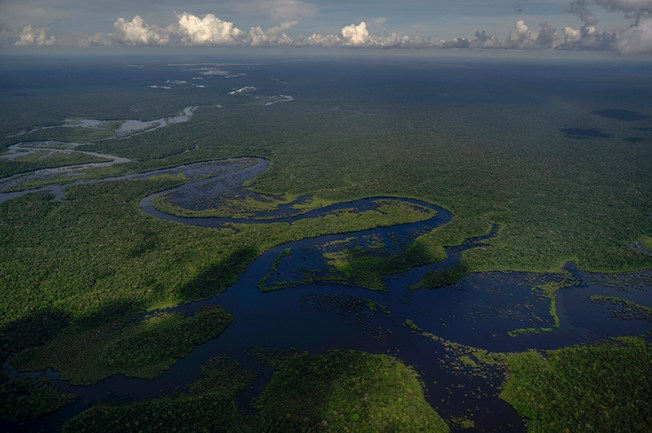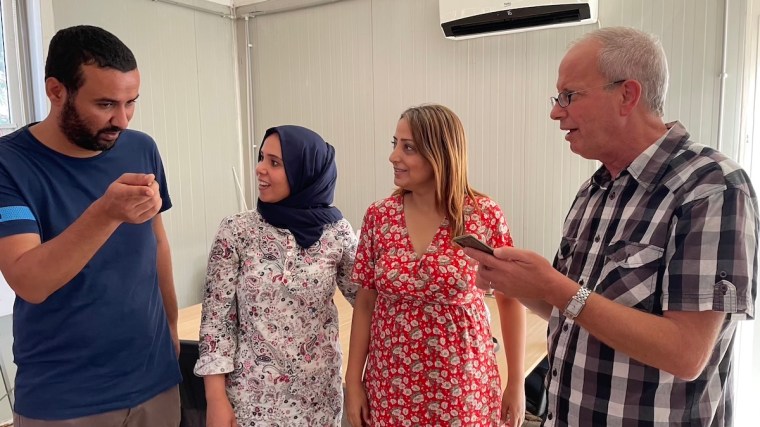The Torch is a weekly newsletter from the Committee to Protect Journalists that brings you the latest press freedom and journalist safety news from around the world. Subscribe here.
On a recent CPJ mission to Tunisia, local journalists spoke to CPJ about the erosion of press freedom alongside other human rights in the country over the last 14 months.
In July 2021, Tunisia President Kais Saied fired Prime Minister Hichem Mechichi and suspended parliament, granting himself sole executive power. A year later, a heavily boycotted voter referendum approved a new constitution to replace what was considered one of the most progressive constitutions in the Arab world.
Since the suspension of parliament, at least four journalists have been arrested, and two were sentenced to several months in prison by military courts. Many others have been attacked by security forces while covering protests. Journalists spoke about the difficulty getting press accreditation and their fear that authorities will undermine the press by prohibiting foreign funding of civil society organizations, including news outlets.
Read the full article on CPJ’s website.
CPJ today condemned the Russian Supreme Court’s revocation of the online license of the independent Novaya Gazeta newspaper. “By revoking Novaya Gazeta’s online license only days after stripping it of its print license, Russian authorities are seeking to erase nearly 30 years of independent reporting and are robbing the outlet of the right to exist,” said CPJ Program Director Carlos Martínez de la Serna in a statement.
Global press freedom updates
- Haitian journalists Frantzsen Charles and Tayson Lartigue shot dead while covering violence in Port-au-Prince
- Italian journalist Mattia Sorbi injured, driver killed in Ukraine’s Kherson region
- CPJ calls on Ukrainian lawmakers to drop media bill
- Russian Journalists’ and Media Workers’ Union shuttered by Moscow court order
- Vietnam sentences blogger Le Anh Hung to 5 years in prison
- Myanmar sentences former BBC Media Action reporter to 3 years in prison
- Russian journalist Badma Byurchiyev assaulted in Elista
- Russian authorities search homes of five journalists as witnesses in investigation into ‘fake’ information about the army
- CPJ condemns 13-year sentence for Belarusian journalist Dzianis Ivashyn
- Explosive detonated outside office of Peruvian TV station Cadena Sur
- Spain set to reform ‘gag law,’ but press freedom groups are skeptical
- Dutch intelligence revealed to have surveilled investigative reporter Stella Braam for decades
- Attendees attack, insult two German reporters covering public political discussion about energy prices
- CPJ calls on President Berdimuhamedov to lift restrictions on Turkmenistan’s press, release journalist Nurgeldi Halykov
- Ethiopian authorities detain journalists Gobeze Sisay and Meaza Mohammed
- Chadian police beat journalist Aristide Djimaldé while covering protest
- Sierra Leonean authorities fine, suspend licenses of Star broadcasters
- Iranian journalist Mansour Iranpour serving one-year sentence in Kerman central prison
- Azerbaijani journalist Avaz Zeynalli, lawyer Elchin Sadygov remanded for four months on bribery charges
- Algerian journalist Belkacem Haouam arrested, held in pretrial detention
Spotlight

Environmental reporting can be dangerous and traumatic for journalists. Whether covering wildfires or flash floods or reporting from remote areas where there is environmental destruction or drug trafficking, journalists face numerous threats on the beat. In a recent Q&A published in CPJ’s Insider newsletter, CPJ Brazil Representative Renata Neder discussed the June murders of British freelance journalist Dom Phillips and Indigenous issues expert Bruno Pereira while they were on a reporting trip in the Amazon forest. “When journalists use their voices to denounce environmental crimes and the destruction of the Amazon forest, they are exposed to a complex context of violence over land and natural resources that leaves dozens killed every year in Brazil,” Neder said. As a Brazilian journalist recently told CPJ, “covering a lawless land is risky.”
Globally, the environment is a dangerous topic to cover. CPJ has recently published a safety advisory for journalists covering the Amazon basin with advice about pre-assignment planning, logistics, health, equipment, and digital security. CPJ also published a summary of key safety steps for covering the region.
Read the full Q&A in the September edition of CPJ’s Insider newsletter and subscribe here.
On September 22, CPJ President Jodie Ginsberg will participate in a United Nations General Assembly side event hosted by the Czech Republic and the High Level Panel of Legal Experts on Media Freedom, called “Providing Safe Refuge to Journalists at Risk in an Increasingly Dangerous World.”
Ginsberg will be speaking alongside Jan Lipavský, Czech Republic minister of foreign affairs; Professor Can Yeginsu, deputy chair of the High Level Panel of Legal Experts on Media Freedom; and Roman Anin, co-founder of iStories and a former journalist at Novaya Gazeta. Register to watch the webinar live, or live stream the event via YouTube.
What we are reading (and listening to)
- Although the killing of journalists is rare in the U.S., threats of doing so are not — Michel Martin, NPR
- A Slain Reporter, a City of Sin and a Politician Charged With Murder — Nicholas Bogel-Burroughs and Mike Baker, The New York Times
- In U.S. journalist’s death, Israel leaves questions unanswered — The Washington Post Editorial Board
- Daniel Ortega’s war on Nicaraguan journalism: 54 media outlets shut down — Confidencial
- Mass firing at UAE newspaper raises question of censorship — Isabel Debre, The Associated Press
- South Africa’s Jacob Zuma is taking a top reporter to court. The verdict could affect journalists’ rights — Anton Harber, The Conversation
- How Rwanda’s Stifling of the Press Prevents Proper Accountability for Asylum Scheme — Iain Overton, Byline Times
- Despite UAPA Bail for Siddique Kappan, a Struggle to Find People to be Sureties — Fatima Khan, The Quint
Do you have an Amazon Alexa-enabled device? Enable CPJ's flash briefing skill to stay up to date with the latest press freedom news from around the world.
